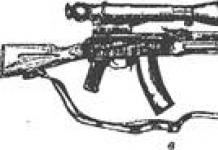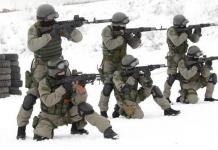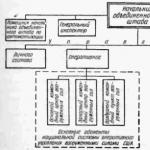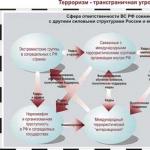The entire vocabulary of the English language can be divided into two groups: meaningful words and functional words. In English-Russian dictionaries there is a translation of each word. But in many cases, the translation of a word in the dictionary cannot fully convey its meaning, be it functional or meaningful. This meaning of the word can be called neutral. The true meaning of a word appears in a sentence when the word performs its functions and “cooperates” with other words.
Many errors are often made in the use of function words such as prepositions, articles, pronouns, and conjunctions. Usually these topics are not considered complex and receive little attention. Consider the pronoun OTHER, which translates as: other, other, other and others; and which is precisely the word that not everyone understands correctly. When translating from English, few people pay attention to the fact that the pronoun “other” appears either with the article “the” –> the other, or without the article at all –> other, sometimes with the suffix “s” –> others, in a word, some do not pay attention to such “little things” and believe that the most important thing is to know the translation of the pronoun “other”. But this is the wrong approach. One has only to try to translate sentences with the pronoun “other” into English, then difficulties will immediately arise. But even if the meaning of the word is more or less clear, that's not all. You need to know its functions and place in the sentence. Often, by incorrectly determining the place of an adverb or pronoun in a sentence, you can lose a point for a mistake.
I will write a couple of sentences in Russian as an example.
This dictionary is missing a few pages. Give me another.
He already another car.
We have twenty people working in our office. Six people from Japan, three from India, and other- from England.
In order to be well versed in the translation of the pronoun "other", let's consider it in more detail.
The pronoun OTHER can function as a pronoun-adjective (adjective-pronoun) and a pronoun-noun (noun-pronoun).
1. OTHER as a pronoun-adjective(adjective - pronoun) comes before a noun in the definition function in the same way as an adjective. Then the pair of words “other + noun” should be considered, taking into account the category of the noun. Nouns are countable and uncountable. If nouns are countable, then they have a number - singular and plural.
a) CALCULATED nouns.
Before OTHER, as well as before any adjective, in accordance with the rules for the use of articles, there may be a definite (the) or indefinite article (an), or there may be no article. There may also be a determiner that refers to a noun.
Noun in singular.
Indefinite article an with the pronoun other is written together, forming the pronoun - another. The pronoun ANOTHER makes sense: ANOTHER.
ANOTHER apple = ONE MORE apple= another apple = another apple;
Show me another dress. = Show me another dress.
Give me another book. = Give me another book.
The definite article the with the pronoun other it makes sense: SECOND of two, REMAINING of two;
THE OTHER apple = THE SECOND of THE TWO= another apple = remaining apple;
I've bought two books. This book is interesting. The other book is interesting too. = I bought two books. It's an interesting book. The other book is also interesting.
The house is on the other side of the street. = The house is on the other side of the street.
noun in plural.
The absence of the article before the pronoun makes sense: EVEN MORE of something or someone;
OTHER apples = SOME MORE apples= more apples = more apples;
I have got other questions. = I have more (other) questions.
Have you got any other books? = Do you have any other books?
The definite article before the pronoun makes sense: ALL OTHER FROM the set.
THE OTHER apples = ALL REMAINING apples = other apples = all other apples;
Where are the other books you have bought? = Where are the other (remaining) books you bought?
Can you tell the other students that I'll be late. = You can tell the other (other) students that I will be late.
b) UNCOUNTERABLE nouns.
The absence of an article before a pronoun with an uncountable noun means - MORE water, butter, bread.
OTHER water = SOME MORE water= MORE (LITTLE) water.
Please give me other water. = Please give me some more water.
The definite article before a pronoun with an uncountable noun means - ALL OTHER butter, ALL OTHER water, ALL OTHER bread;
THE OTHER water = THE REMAINING water= ALL WATER, (what is left).
Please give me the other water. = Please give me all the water that is left.
2. OTHER as a pronoun - noun(noun-pronoun) has, like a noun, singular (OTHER) and plural (OTHERS) number; and possessive - (OTHER'S or OTHERS'). In a sentence, the pronoun OTHER behaves like a noun.
I will write some examples.
I don't like this book. give me another. = I don't like this book. Give me (any) another one.
I know you've bought two books. I don't like this book. Give me the other. = I know that you bought two books. I don't like this book. Give me another one (second book of the two you bought).
One of them is mine, the other is my sister's. = One of them is mine, the other is my sister's.
I don't like these books. give me others. = I don't like these books. Give me (some) others.
I don't like these books. Give me the others, which you've bought. = I don't like these books. Show me the others (the rest) you bought.
This is my opinion, but the others think differently. = This is my opinion, but others think otherwise.
Some pupils are smarter than others. = Some students are smarter than others.
One of my son is married to a housewife. The other's wife is a teacher. = One of my sons is married to a housewife. The other son's wife is a teacher.
There are only two reciprocals in English: each other and one another, both of which mean "each other". The main question associated with them: if they do not differ in meaning, then when to say each other, and when one another? What is the difference between them?
Each Other or One Another? The rule that no one follows
In some textbooks there is a very specific rule. Looking ahead, I will say that it is not necessary to comply with it. However, here is the rule:
- We are speaking each other when it comes to two persons or objects.
Mary and James love each other. Mary and James love each other.
Two stones are placed against each other. - Two stones are located opposite each other.
- We are speaking one another when there are more than two persons or objects.
The kids can't hear one another. The children don't hear each other.
The stars are very far from one another. The stars are very far apart.
It is not necessary to observe it, because in modern English, especially in, the semantic difference between mutual pronouns has practically disappeared, while the more common option is each other.
To quote from the Cambridge Dictionary: “There is very little difference between each other and one another and we can normally use them in the same places. Each other is more common than one another.”
In other words, in all cases where either each other or one another is possible, you can safely use the first option:
The kids can't hear each other. - Children do not hear each other (even if there are more than two of them).
The stars are very far from each other. – The stars are very far apart (even if they are all the stars in the universe).
If you want to strictly follow the rules, see the rule above.
Reciprocal pronouns Each Other and One Another with a preposition
Unlike the Russian pronoun "each other", reciprocal pronouns in English inseparable, that is, between words, their components cannot be wedged in a preposition, as in Russian. Compare:
- In Russian: We never speak about each other(the preposition "o" wedged between "friend" and "friend").
- Correctly: They never talk about each other.
- Not properly: They never talk each about other.
Each Other and One Another in the possessive case
Reciprocal pronouns can be used in the possessive case, an apostrophe + s is added to the end of the word other or another:
They see each other's faces. They see each other's faces.
Don't get on each other's nerves. Don't get on each other's nerves.
A common mistake in this case is the incorrect spelling of the pronoun in the possessive case: each others is written instead of each other's (curiously, this mistake is usually made by native speakers). Optionseach others, one anothersimpossible- reciprocal pronouns cannot be plural.
In order not to miss new useful materials,
If you are reading this material, you have obviously already read the first article on indefinite pronouns in English(). Also in the first part of this topic you will find a general test for all indefinite pronouns. As you have already noticed, this is the largest group of pronouns. Moreover, each of them needs to be discussed separately, since they have their own nuances of use. And the context in which they are used may also differ.
Pronoun both
This pronoun should be translated in the following words: both, and the one and the other; and... and. In Russian, these words are used in speech quite often. How do we use this pronoun in English? As a pronoun-adjective, it performs the function of a definition in a sentence. Note that the noun in question in this situation can be followed by the definite article.
Both these shops are too expensive. Both of these shops are too expensive.
Both my friends are invited to this party. Both my friends are invited to this party.
Indefinite pronoun both also used as a noun. Then its functions in the sentence are , nominal part . When both is the subject of the sentence, the verb-predicate should be pluralized.
Both of them are mine. They are both mine.
– We were both in the hospital. We were both in the hospital.
I know two versions of what has happened. Both are correct. I know two versions of what happened. Both are correct.
– Did you watch the movies I advised you? Have you seen the films I recommended?
– Yes, I've seen both. Yes, I've seen both.
Pay attention to the placement of the indefinite pronoun both:
- before the verb-predicate;
- after to be;
- between auxiliary verbs, if there are two;
- after (if we have a combination of modal verb and);
- before an auxiliary or modal verb in short answers;
- after pronouns in object .
they both took part in this competition. Both of them took part in this competition.
They should both be disqualified! Both of them should be disqualified!
We have both been tested. We've both been tested.
Who will tell him? Who will tell him?
– We both will. - Both of us.
I am fond of them both.- I like them both.
And, finally, here's another point: the indefinite pronoun both not used in negative sentences. The pronoun comes to help and replace him neither , which we will discuss below.
Neither of them believed me. They both didn't believe me.
Pronouns either, neither
The first of the presented pronouns is translated "one or the other", "one of the two", "any of the two", and, accordingly, refers to two persons or objects. When this pronoun is an adjective, it is used with singular countable nouns.
Either book will do. Any of these (two) books is fine.
I didn't like either restaurant. “I didn’t like either one or the other restaurant. (and there are two restaurants)
When either is a noun pronoun and is often followed by of :
either of you may come. Any of you can come.
Don't forget: if either is the subject, the verb-predicate should be put in the singular form.
Has either of you read this report? - Any of you read this report?
Negative option either is an indefinite pronoun neither. And his translation is appropriate: neither one nor the other; nobody.
Neither of my friends is reliable. “None of my friends can be relied upon.
Is she German or British? Is she German or English?
– Neither. She is American. - Neither one nor the other. She is American.
Pronouns each, every
There is a slight difference between these two indefinite pronouns in English: the first is used for a limited number of persons or things, and for the second there are no restrictions. Their translation is the same - each (at every also "everyone").
Working as a pronoun-adjective, each placed before a singular countable noun.
each man will be paid according to his ability. “Each worker will be paid according to his classification.
each building contains twenty flats. - There are twenty apartments in each house.
But as a pronoun-noun, this word in most cases (but not always) takes the preposition of:
He gave each of us a ticket. He gave each of us a ticket.
The apples cost 20pence each. “Apples cost twenty pence apiece.
And here is the indefinite pronoun every can only work as an adjective pronoun before singular countable nouns.
Not every man can swim. Not everyone can swim.
He checked the buses coming every ten minutes. He checked the buses coming every ten minutes.
Behind every great man there is a great woman. Behind every great man is a great woman.
In the first article, we talked about pronouns derived from words some, any, no: somebody, anyone, nothing, anywhere, etc. Indefinite pronoun every can also form other pronouns with words body, one, thing, where: everybody, everyone(every, everyone, everyone) everything(all), everywhere(everywhere). In the sentence these words (except everywhere) are subject or object because they are used as noun pronouns. Note that the verb-predicate with them is singular.
Everyone has his own opinion. - Everyone has their own opinion.
Everybody hates him. - Everyone hates him. (everyone hates him)
Everything you know about fitness is a lie. Everything you know about fitness is a lie.
English is everywhere! – English everywhere!
Pronouns other, another
Translation of pronouns other/another are the words "other", "other". And we can use them both as nouns and as . If this pronoun is an adjective, put it before the noun (in any number). Moreover, before the pronoun other There can be both definite and indefinite articles. Combined with the indefinite article an we get the pronoun another, which can also be translated as "more".
We must find some other way. We must find another way.
There was no other place to go. “There was nowhere else to go.
We shall visit the other parks tomorrow. We must visit other parks tomorrow.
Let's join them another time. Let's go with them another time.
Will you have another cup of coffee? – Will you have more coffee?
Pronouns other, another we use to replace a noun in the singular: if you need to replace a word with an indefinite article, we take another; if with a certain - the other. If you need to replace a plural noun, use the form others.
She has bought one bag, and now she is going to buy another. She bought one bag and is now going to buy another.
There is one key in this drawer. Where is the other? There is one key in this box. Where is the other?
I chose this article because there were no others describing this problem. – I chose this article because there were no others describing this problem.
Pronoun one
The last indefinite pronoun in English that we will pay attention to is the pronoun one . As a noun pronoun, this word is used:
- As a subject in indefinite personal sentences:
One must learn English. - You need to learn English.
- To avoid repeating the noun that was mentioned before:
–Don't you want to buy a dictionary? Are you going to buy a dictionary?
Thanks. I have one. Thanks, I have (one).The white bridge is longer than the black one. – The white bridge is longer than the black one.
We have two different questions. Which one would you like to answer? We have two different questions. Which one would you like to answer?
However, it should not be used after possessive pronouns - my, his, her, our, your, their– and after nouns in .
This is my book. Yours is on the other table. - It is my book. Yours is on the other table. (not your one)
My house is bigger than Jack's. My house is bigger than Jack's house. (not Jack's one)
There is quite a lot of information describing indefinite pronouns in English. Therefore, if you learn the material of both articles, you can rightfully be proud of yourself!
If you find an error, please highlight a piece of text and click Ctrl+Enter.
Today we will talk about a group of pronouns with which we express the relationship of two or more persons. It contains two expressions: each other and one another.
Let's look at when they are used, how they differ and how they change.
What are reciprocal pronouns?

Reciprocal pronouns in English express relation to two or more persons. The very name "mutual" indicates that with the help of them we say that some actions are performed mutually. For example: They always help each other.
This group is represented by two expressions:
- each other - each other
- one another - each other
Let's look at them in more detail.
Using each other and one another in English
Each other and one another translate as "each other" and are used when two or more people each do something for the other/others.
There used to be little difference between these expressions. Each other was used when talking about two people or objects (For example: We have known each other for 10 years). One another was used when talking about 3 or more people or objects (For example: Children played with each other). But now this distinction is not respected, and you can easily replace one expression with another.
We put each other and one another after an action that is mutually performed. Usage scheme:
Two or more actors + action + each other/one another
Examples:
We protect each other.
We protect each other.
They trust one another.
They trust each other.
tom and mary love each other.
Tom and Mary love each other.
All members of the committee hate one another.
All committee members hate each other.
Using each other and one another with prepositions

If you use these phrases with prepositions (with each other, for each other, etc.), then it is placed BEFORE these phrases. It is in front of the entire expression, without dividing it into parts.
- for each other / one another - for each other;
- without each other/one another - each without a friend;
- from each other / one another - from each other;
- with each other / one another - with each other;
- about each other / one another - about each other;
Not properly: We were meant each for other.
Correctly: We were meant for each other.
We were made for each other.
Examples:
We need to take a break from each other.
We need to take a break from each other.
They enjoy talking with oneanother.
They like to talk to each other.
Jane and Bill can't live without each other.
Jane and Bill cannot live without each other.
They exchanged seats with eachother.
They switched places with each other.
Using each other's and one another's in English
If after each other and one another there is an object, then we add "s at the end of the expression. That is, it will turn out other "s and another "s. How to check? We can ask them questions: whose? whose? whose? whose?.
For example: They wore things (whose?) each other.
Examples:
We can read each other "s minds.
We can read each other's minds.
They translated each other "s sentences.
They translated each other's sentences.
My dogs eat one another 's food.
My dogs eat each other's food.
Sisters wear one another 's dresses sometimes.
The sisters sometimes wear each other's dresses.
So, we have considered the mutual pronouns each other and one another, and now let's put the theory into practice.
Reinforcement task
Translate the following sentences into English:
1. They know everything about each other.
2. Jim and Emmy call each other every evening.
3. People should help each other.
4. They often cook for each other.
5. We know each other's secrets.
6. My friends like each other.
7. They are used to having dinner with each other.
8. Children often play with each other.
Leave your answers in the comments below the article.
A pronoun or pronoun is a part of speech that indicates objects, quantities, or signs, without naming them. As in Russian, pronouns in English can act as a subject, a predicate, or one of the secondary members of a sentence.
The whole catch with using pronouns is that without a specific context, the meaning of pronoun sentences can be lost. That is why in most cases pronouns are used to replace the previously mentioned objects, persons, signs.
As you can see from the example above, pronouns help to dilute the text by avoiding frequent repetition of the same words. Thanks to them, the proposals do not sound monotonous and primitive.
But let's dwell on the varieties of pronouns and study in more detail the features of each in order to avoid mistakes or stupor in communication.
By structure, English pronouns are divided into 3 groups:
| Group | difference | Example | ||
| 1 | Simplepronouns or simple pronouns | Consist of a single root | I- I he- he they- they |
us- us the same- same whose- whose |
| 2 | Compoundpronouns or compound pronouns | Consist of two or more roots | somebody(some + body) = someone myself(my + self) = myself / myself nothing(no + thing) = nothing |
|
| 3 | Compositepronouns or compound pronouns | Consist of multiple words | each other- each other one another- each other |
|
Pronouns in English: types
The types of pronouns in English are a more diverse list, consisting of 9 sub-items. Let's consider each in more detail:
Personal Pronouns or Personal Pronouns
Personal Pronouns or Personal Pronouns is one of the most widely used groups. This is the only kind of pronoun in English that has a declension. Declension of pronouns in English is much simpler, since the number of cases is limited to only two:
| Cases | Nominative case | Objective case | |
| difference | Used instead of nouns | Used instead of supplement | |
| declination | |||
| face and number | |||
| 1 l., units | I- I | me- me / me / by me | |
| 1 l., pl. | we- we | us[ʌs] - us / us / us | |
| 2 l., unit | you- you | you- you / you | |
| 2 l., pl. | you- you | you- you / you / you | |
| 3 l., unit | he- he she[ʃi:] - she it- this is it |
him- his / him / them her- her / her it- this is |
|
| 3 l., pl. | they[ðei] - they | them[ðem] - them / them / them | |
It is important to note that:
- the pronoun I (I) in English is always capitalized.
- English does not speak "you" or "you", in both cases the pronoun you should be used, which makes it easier to start a conversation with a stranger.
- The pronoun it in English, in turn, is used when referring to inanimate objects, animals and birds. However, very often pet owners refer to them using the pronouns he and she, so such a substitution will not be considered a mistake.
Examples of using:
| I had no idea she is so talented. | I had no idea that she is so talented. |
| I want to warn you that she has a very complicated character. | I want to warn you, what she has very complex character. |
| He is really proud of them. | He really proud of them. |
| Could you translate me the exercises into English? | Could you you translate to me are these exercises in english? |
| It is such a pleasure to be surrounded by all these intelligent people. | (It) Such a pleasure to be surrounded by all these smart people. |
| Whatever happens they will always love you. | No matter what happens, they will always be you be in love. |
| I love my puppy he (it) is such a lovely boy. | I love my puppy he such a lovely boy. |
| It has an indirect relationship to the case. | it is indirectly related to the case. |
Possessive Pronouns or Possessive Pronouns
Possessive Pronouns or Possessive pronouns are a type of English pronoun that shows ownership and answers the question “whose?”. There are 2 forms of possessive pronouns:
| Attached form | Absolute form |
| my- my | mine- my |
| your- your | yours- your |
| his- his | his- his |
| her- her | hers- her |
| its- his | its- his |
| your- your | yours- your |
| our- our | ours- our |
| their[ðeə(r)] - their | theirs[ðeəz] - their |
| This form of the possessive pronoun is in front of a person/thing. It shows ownership and replaces articles. Sometimes these pronouns can be omitted when translated into Russian. | Replaces a noun that has already been discussed to minimize repetition. |
Examples of the use of English pronouns of this type in tables:
| Attached form | |
| Her life was full of ups and downs. | Her life was full of ups and downs. |
| Our relationship with Ann is not your business. | Our relationship with Ann is not your a business. |
| My goal in life is to make a contribution to the world prosperity. | My the goal in life is to contribute to the prosperity of the world. |
| I intend to keep my word. | I intend to contain (own) word. |
| All members of my family study English. | All members my families learn English. |
| Absolute form | |
| Don't even look at her; this girl is mine. | Don't even look at her; this girl my. |
| It's not my guilty but yours. | It's not my fault, but yours. |
| The idea was his, not ours. | The idea was his, but not our. |
Reflexive Pronouns or Reflexive Pronouns
Reflexive Pronouns or Reflexive pronouns are pronouns that are equivalent to the Russian pronouns “himself” and “himself” or particle -sya in verbs.
| myself | I cut myself while shaving. (I cut Xia while shaving.) |
| yourself | Can you tell us a little about yourself?
(Can you tell me a little about yourself?) |
| himself | You shouldn't come because George will do everything himself.
(You don't have to come, because George will do everything myself.) |
| herself | She can't write a coursework herself.
(She can't write term paper alone (on her own).) |
| itself | The plan itself was a failure. (Plan on my own was a failure.) |
| yourselves | My God, look at yourselves!
(Oh my God, look on themyself!) |
| ourselves | We must take care of ourselves.
(We should themselves take care of yourself.) |
| themselves[ðəm'selvz] | They identify themselves as heroes. (They consider myself heroes.) |
This type of pronoun cannot be used with self-directed verbs. These include words such as: feel (feel), bath (take a shower), wash (wash), hide (hide).
Reciprocal Pronouns or Reciprocal Pronouns
Reciprocal Pronouns or Reciprocal Pronouns is one of the smallest groups, consisting of two compound pronouns that are used alone or after prepositions.
Interrogative Pronouns or Interrogative Pronouns
Interrogative Pronouns or Interrogative Pronouns are pronouns that begin special questions. These include:
| what- what / what | What are you going to do next? |
| who- who will win | Who told you that nonsense? (Who told you this nonsense?) |
| which- which / which | Which of these cars do you like more? (Which Which of these cars do you like best? |
| whom- whom / to whom | To whom do you wish to speak? (With whom Do you want to talk?) |
| whose- whose | Whose order it was? (Whose was it an assignment? |
| how- how | how much does this dress cost? (How is this dress worth it? |
| why- why | why did you act like an idiot yesterday? (Why were you acting like an idiot yesterday? |
| when- when | When do you have time to do Spanish exercises with me? (When Do you have time to do Spanish exercises with me?) |
| where- where / where | Where do you usually spend time in the evening? (Where do you usually spend time in the evening? |
Note that the pronoun who does not require an auxiliary verb. It can also be used in place of the pronoun whose. Often there is a problem of choosing between the pronouns which and what in the meaning of "which". Which is used when the choice is limited, what when the choice is unlimited.
Relative and Conjunctive Pronouns or Relative and Connective Pronouns
Relative and Conjunctive Pronouns or Relative and connecting pronouns - groups of pronouns, the use of which in English is necessary in a complex sentence, or rather in its subordinate clause. Relative pronouns in English have words in their list that are similar to interrogative pronouns, but their translation and functions are different.
| that[ðæt] - which (for animate and inanimate objects) |
Do you know the girl that is standing over there? (You know girl, which standing over there?) |
| which- which the (for inanimate objects) |
The costume that I saw in this store will suit you. (Costume, which the I saw in this store, will suit you.) |
| who- which the (for animate objects) |
The boy who broke the window ran away. (Boy, which the broke the window, ran away.) |
| whose- which the (in the meaning of belonging) |
Give me the details of the person whose number it is! (Give me details of the person, to whom this number belongs! |
| whom- which | The doctor whom I know very well will help you. (Doctor, whom I know very well will help you.) |
| what- what / what | That wasn't what he expected to see. (That's not what what he expected to see.) Sport exercises are what makes people healthy. (Sports exercises - here what makes people healthy.) |
Demonstrative Pronouns or Demonstrative Pronouns
Demonstrative Pronouns or Demonstrative pronouns are pronouns that in English indicate a person or object, highlighting them from the mass. In addition to the determiner of the noun, in the sentence there are in the role of subject and object.
Examples of using:
| That game was fantastic! | (Ta) The game was fantastic! |
| This is that man I talked about. | This is the one the person I was talking about. |
| You deserve to be happy, don't forget about this. | You deserve to be happy, don't forget about this. |
| Have you done these exercises? | You did these exercises? |
| Those were the most challenging days of my life. | it were the hardest days of my life. |
| It is such an honor to be here with you today. | For me such an honor to be here with you today. |
| He repeated me same thing, trying to convince me not to do it. | He repeated same trying to convince me not to. |
| I met him in same place. | I met him at same place. |
| I will never forget those words she told me. | I will never forget (those) the words she said to me. |
| I fell down the stairs while she was looking at me; that was such an awkward situation. | I fell down the stairs as she looked at me. It was such awkward situation. |
Quantitative pronouns or Quantitative pronouns
Quantitative pronouns or Quantitative pronouns are pronouns that are responsible for expressing the number or quantity of objects and persons.
| much- many (with uncountable nouns) | There is no much information provided about his last years. (About his last years of life there are few (a little) information.) |
| many- many (with countable nouns) | I don't have many friends. (I have few (a little) friends.) |
| little- few (with uncountable nouns) |
Little has been found out about the organization. (About the organization few what is known.) |
| alittle- a little (with uncountable nouns) | We have a little water left. (we have left a little water.) |
| few- little (with countable nouns | There were few people in the cinema. (The cinema was few of people.) |
| afew- several (with countable nouns) | I have a few questions to ask. (I want to ask several questions.) |
| several- several | Several men appeared in front of me. (before me appeared several human.) |
As you may have noticed, quantitative pronouns in English with a translation into Russian turn into adverbs. In addition, despite the fact that many quantitative pronouns are translated the same way, in English you need to be able to distinguish them in order to correctly express your thoughts with certain pronouns in certain situations.
Indefinite Pronouns and Negative Pronouns or Indefinite Pronouns and Negative Pronouns
Indefinite Pronouns and Negative Pronouns or Indefinite pronouns and negative pronouns are the most extensive group of pronouns.
This group includes the pronouns some, any, no and every, as well as their derivatives, with which you can make both a definite and a negative pronoun.
| Basic pronouns | Derivatives | |||
| thing | one | body | where | |
| some | something - something | someone - someone | somebody - someone | somewhere - somewhere |
| any | anything - anything | anyone - someone | anyone - someone | anywhere - anywhere |
| no | nothing - nothing | no one - no one | nobody - no one | nowhere - nowhere |
| every | everything - everything | everyone - everyone | everybody - everyone | everywhere - everywhere |
Another pair of indefinite pronouns is other and another. Both words are translated as "other", but do not confuse their use cases. The pronoun other is used with certain nouns. It can also be used with plural nouns. While the pronoun another is used exclusively in the singular with indefinite nouns.
Let's look at some examples:
| I have something to tell you. | I need you something to tell. |
| When I needed help no one picked up the phone. | When I needed help nobody didn't pick up the phone. |
| Nobody deserves your tears. | Nobody does not deserve your tears. |
| each of them should be aware of the great potential of this business. | Each of them should be aware of the great potential of this case. |
| His shadow follows her everywhere she goes. | His shadow haunts her wherever she didn't go. |
| Emily is a recluse, and she wants to see nobody. | Emily is a recluse and she nobody doesn't want to see. |
| Did anyone see my English notebook? | anyone Have you seen my English notebook? |
| Why should I choose one bag if I can buy both? | Why should I choose one bag if I can buy both? |
Actually, that's all. These were all kinds of pronouns in English. Having dealt with the structure and having studied all the categories of pronouns, you will not have any difficulties in using them in practice. When confusion arises, refer to the tables above, do the exercises, study these examples and come up with your own.
Views: 1 054


















